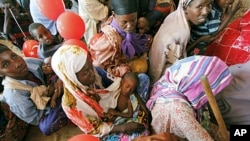The United Nations says fewer people in drought- and famine-stricken Somalia are fleeing their homes, though it notes the crisis in the country is not over.
The U.N. Office for the Coordination of Humanitarian Affairs says 5,000 people have moved into Mogadishu this month, down from 28,000 in July.
The agency's weekly report, issued late Tuesday, says the number of Somalis fleeing to refugee camps in Kenya and Ethiopia has also dropped.
The U.N. agency attributes the decline to increased aid reaching Somalia's Bay, Gedo, Bakool and Hiran regions, especially in areas along the Kenyan and Ethiopian borders.
The agency said it has also received reports that insurgent group al-Shabab continues to restrict the movement of people in areas under its control.
Experts have warned that food production in southern Somalia remains at a historic low, and that famine conditions across the region are likely to continue and spread.
The U.N. has already declared a famine in five regions of southern Somalia.
Somalia and neighboring countries are experiencing their worst drought in 60 years. The U.N. says more than 12 million people are in need of food aid.
Hundreds of thousands of Somalis have fled their homes in recent months in search of food and water. The situation has led to severe overcrowding at refugee camps and the sight of Somalis dying while trying to walk to a place of refuge.
Countries and regional bodies around the world have contributed hundreds of millions of dollars in aid, though the U.N. says still more is needed.
UN: Fewer Somalis Fleeing Homes




